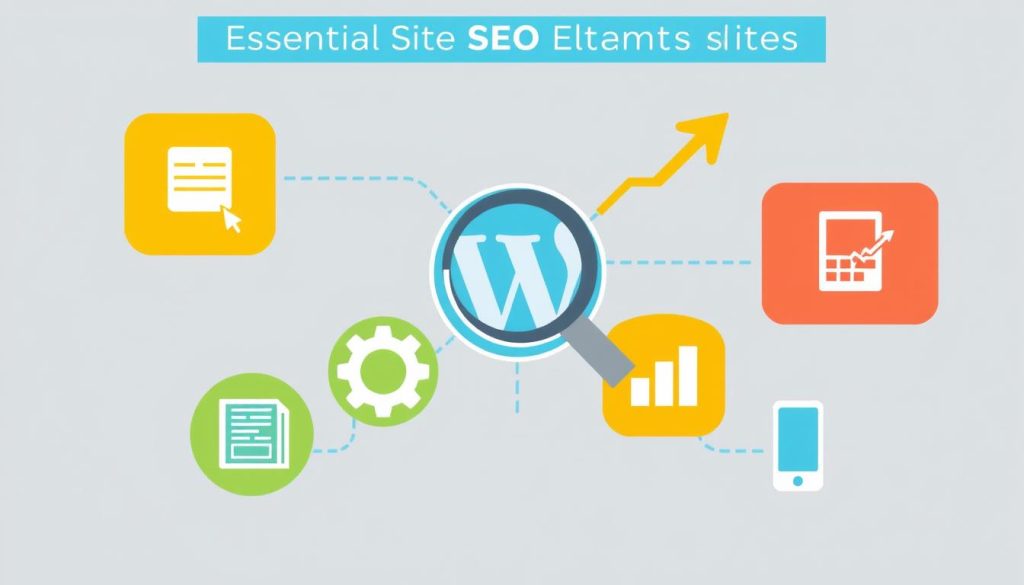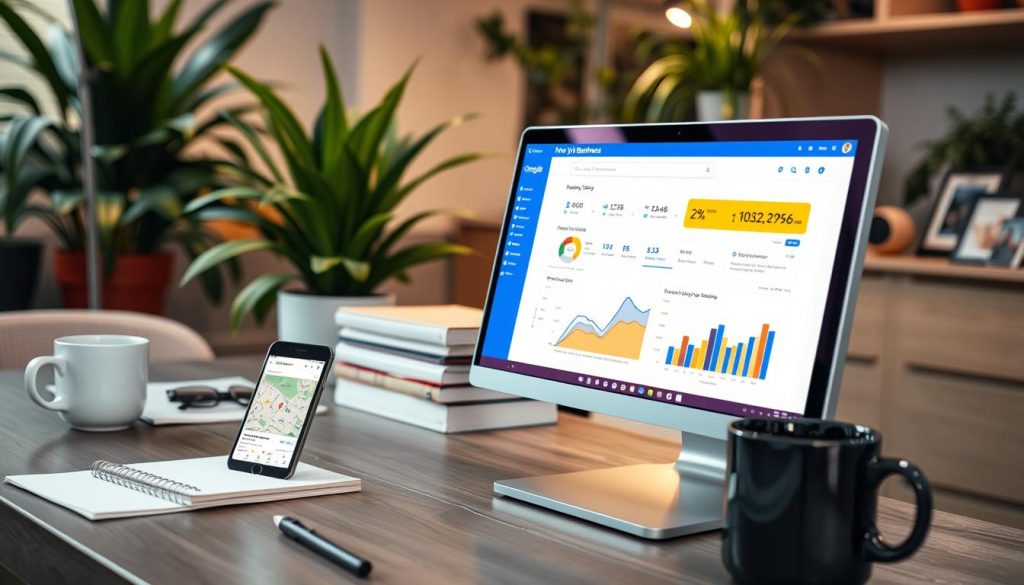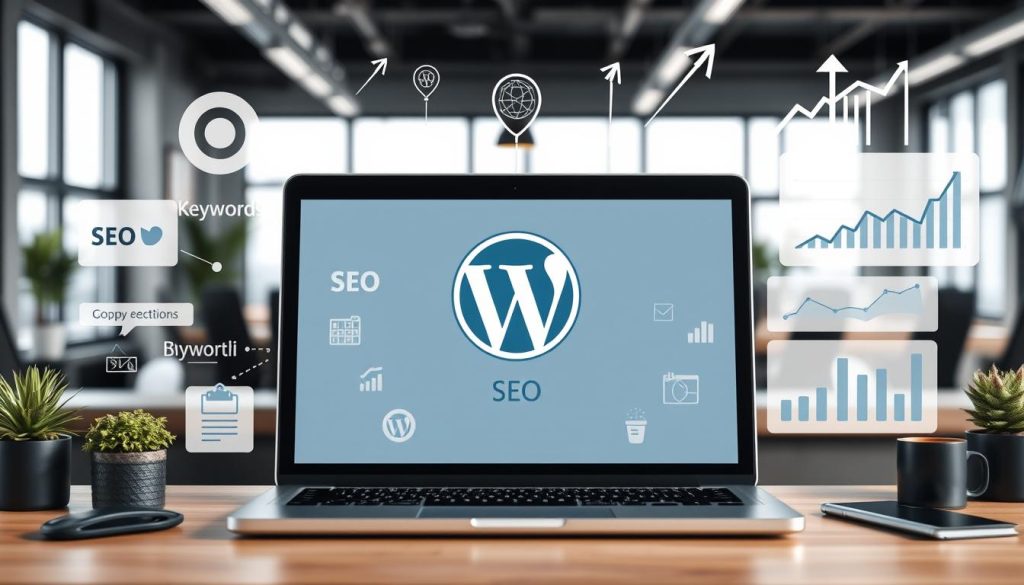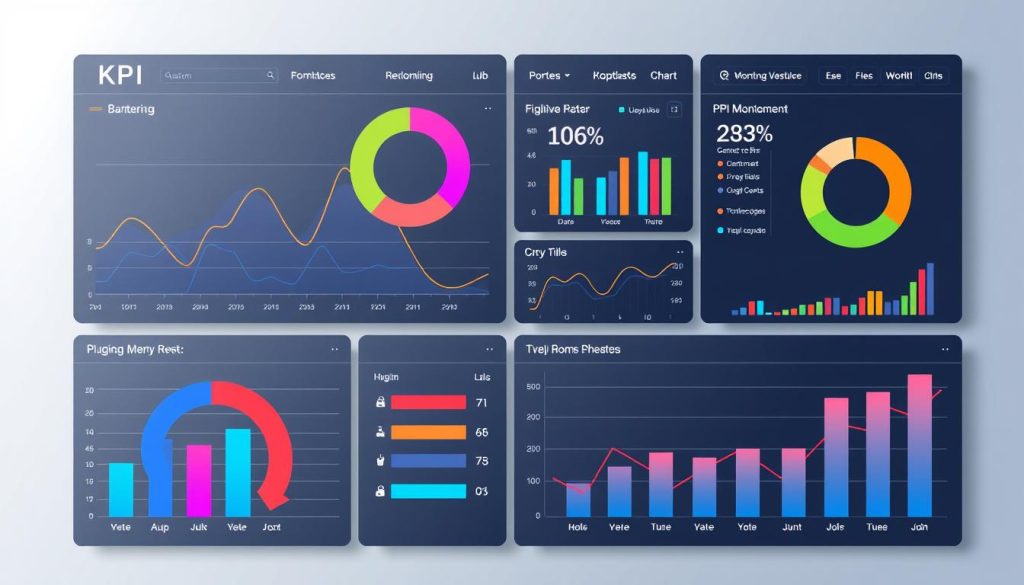The digital world is getting more crowded in the UK, making a strong online presence crucial. Having WordPress SEO experts on your side helps sharpen your website’s edge. They ensure it reaches its full potential. SEO specialists in the UK offer in-depth website SEO optimisation. This not only boosts visibility but also strengthens your online footprint.
These consultants craft personalised strategies to meet your business goals. This leads to tangible results and a solid digital presence. Whether you aim to improve the site experience, climb the search engine ranks, or draw in a specific audience, a WordPress SEO consultant has the know-how you need to succeed.
Key Takeaways
- Professional SEO consultancy specialising in WordPress can substantially improve your site’s ranking.
- Expert SEO techniques are essential to increase your online visibility within the competitive UK market.
- WordPress tailored SEO strategies ensure your website aligns with best practices for optimal performance.
- Working with SEO specialists in the UK means gaining a strategic partner in your quest for digital excellence.
- The right consultancy service will not just optimise your website but also help sustain long-term growth.
Understanding the Role of a WordPress SEO Consultant
In this digital age, being seen on search engines can lead to business success. This is where a WordPress SEO consultant’s expertise comes in handy. They create custom SEO plans within WordPress to boost your online visibility. Let’s dive into why they are so important today.
What is SEO Consultancy?
SEO consultants offer detailed support and advice to help businesses rank better on search engines. They analyze your needs, apply SEO tactics, and keep up with SEO changes and demands.
Key Responsibilities of an SEO Consultant
- Researching and using keywords that match the business’s specific market.
- Improving the site with meta tags, headers, and image tags.
- Overseeing technical SEO to ensure the site structure is SEO-friendly.
- Developing content strategies that meet SEO and user requirements.
- Regularly checking performance and updating strategies based on SEO data.
Benefits of Specialising in WordPress
WordPress-specialised consultants offer unique advantages. Thanks to their in-depth knowledge, they can use WordPress tools and features that others may miss. This includes making the CMS search-engine friendly, using SEO plugins effectively, and choosing the right themes for SEO. These efforts lead to better search engine rankings.
The Importance of SEO for WordPress Sites
Understanding how vital SEO is for WordPress websites cannot be overstated. It makes the most of the platform’s features, boosting search rankings and increasing organic traffic. These elements are key for any online marketing plan.
- The abundance of SEO-friendly plugins available on WordPress is a major advantage. They make optimisation easier.
- These tools help polish content, enhance metadata, and upgrade site structure. All essential for a better search engine placement.
The adaptable nature of WordPress means you can quickly update content. This keeps your SEO up-to-date with search engine changes.
- Keeping up with SEO is vital for WordPress sites to stay ahead in the competitive online world.
- With strong SEO, WordPress sites get more organic visitors. This boosts the site’s authority and builds trust with users.
By focusing on these SEO strengths in WordPress, businesses and creators can make the most of their online presence. They meet the needs of their audience while growing their reach.
Analyse Your Current SEO Performance
Starting to make your website more visible begins with a deep analysis of its SEO. You need to check how it’s doing, use SEO audit tools, and add useful WordPress plugins. These steps help spot what needs to be better.
SEO Audits: A Starting Point for Optimisation
Doing a thorough SEO audit is vital in finding out what’s good and bad on your site. With strong SEO tools, you can find technical problems, check how well your pages are set up, and look at your links. All these should meet SEO standards.
Key Metrics and Indicators to Monitor
Watching certain metrics shows how well your site is doing in SEO. Important things like how fast your pages load, if visitors stay, and where you rank for keywords are key. They help you know how users and search engines see your site.
Tools and Plugins for SEO Analysis
To keep improving your SEO, using the best tools and plugins is key. Plugins like Yoast SEO and Google Analytics offer detailed views of your performance. They make it easier to watch and tweak your SEO to match search engines.
On-Page SEO Strategies for WordPress
Improving your WordPress site’s on-page SEO is key to getting higher rankings. It also increases the organic reach of your content. We will cover important on-page SEO techniques, such as making your content better, enhancing meta tags, and improving internal links.
Optimising Content for Search Intent
To make sure the right users find your content at the right time, align it with search intent. For this:
- Look into user queries to grasp their search intent.
- Develop content that meets users’ needs well.
- Include relevant keywords in your content to boost visibility.
Enhancing Meta Tags and Descriptions
Improving your meta tags can really help increase click-through rates from SERPs. Important tactics include:
- Crafting engaging meta descriptions that give a clear preview of your content.
- Making meta titles and descriptions better with targeted keywords.
- Having unique meta tags for each page to prevent duplicity.
Improving Website Structure with Internal Linking
Internal linking greatly helps in creating a well-structured website. It aids user navigation and search engine indexing. Some effective strategies are:
- Linking to relevant content on your site to keep users interested.
- Using descriptive anchor texts that are both informative and rich in keywords.
- Making sure key pages are easily accessible from the homepage.
Technical SEO: Improving Site Speed and Security
In the world of WordPress, improving technical SEO is key. It means making your site faster and more secure. WordPress SEO experts work hard to strengthen both areas. This helps attract more visitors and gets the approval of search engines.
Speeding up your WordPress site is crucial for staying ahead of the competition. Faster websites rank better on Google and offer a better experience for visitors. Similarly, making your website safer is vital. It protects users’ data, builds trust, and keeps hackers away.
- Implementing caching tools to decrease page load times.
- Opting for high-quality hosting solutions that offer dedicated resources and advanced security features.
- Regular updates to WordPress themes, plugins, and core software to patch security vulnerabilities and optimise performance.
- Utilising content delivery networks (CDNs) to distribute server load and decrease site loading time.
- Enforcing strong password policies and secure sockets layer (SSL) certificates to boost website protection.
Good WordPress site speed and security measures are key for SEO success. They help bring more visitors and keep them coming back. Plus, they protect your site from security breaches that can harm your reputation.
Off-Page SEO Techniques and Building Authority
To boost your website, off-page SEO is vital. It makes your site more visible and builds market authority. Backlinks, digital PR, and social media SEO are essential.
The Power of Backlinks
For better rankings, backlinks are key. They make your site look trustworthy to search engines:
- Chase quality backlinks from high-authority websites rather than just collecting many.
- Consider guest blogging on known sites for good backlinks.
- Use tools to keep your backlink profile healthy and strong.
Strategies for Digital PR
Digital PR should fit with your marketing. It brings visibility and builds your reputation:
- Create content that attracts media and gets shared.
- Work with influencers to spread the word about your brand.
- Use analytics to track digital PR and improve it.
Social Signals and Brand Mentions
Social media SEO helps share your brand online. Keep your profiles updated to engage users:
- Post interesting content regularly.
- Boost social signals by sharing user content and starting conversations.
- Track and respond to mentions of your brand with social listening.
These off-page SEO strategies boost your online image and authority. Focus on backlinks, digital PR, and social media for success.
Local SEO for WordPress: Attracting Local Traffic
To succeed locally, boosting visibility with local SEO on WordPress is key. This includes strategies like WordPress local SEO, optimising for Google My Business, and managing local citations. All these steps help attract the local crowd to your business.
Importance of Google My Business
Google My Business is at the core of local SEO. It elevates your business’s visibility and interaction in local searches. By setting up your profile, you’ll show up directly to local shoppers, sharing key details like your location and services.
Citations and Local Directories
Being listed accurately in local directories is crucial. Local citations boost trust and credibility with local shoppers. They also enhance your SEO by confirming your business exists.
Geo-Targeting and Localised Content Strategies
Using geo-targeting in your content raises your visibility. By crafting content for the local audience, you reach them more efficiently. It makes your WordPress site appealing and relevant to the local market.
By applying these tactics, you can climb local search rankings and draw more local traffic. This turns WordPress local SEO into a vital strategy for your online marketing.
Content Marketing: Engaging Your Audience Effectively
An effective content marketing strategy focuses on creating and sharing WordPress content that grabs and keeps the audience’s attention. We’ll discuss key methods to make sure your content draws viewers in and keeps them interested. This uses WordPress’s strengths as a content management system.
To keep your audience coming back, you need a detailed content marketing plan that understands engagement. WordPress gives you the tools to make content that your target audience will love. It also helps with SEO to bring in new people. Here are ways to make your WordPress content more engaging.
- Understand Your Audience: Make your content suit your audience’s likes and needs. WordPress’s analytics tools help you learn about your viewers’ habits and what they enjoy.
- Create Valuable Content: Your content must offer something useful, whether it teaches, informs, or entertains. Quality is crucial for keeping your audience interested.
- Optimise for Search: Use WordPress’s SEO tools and plugins to make your content more visible on search engines. This brings more visitors to your site.
- Interactive Elements: Adding interactive things like polls, quizzes, or fun pictures can make people spend more time on your site.
- Consistency is Key: It’s important to keep your content fresh and up to date. WordPress has scheduling tools to help you post regularly.
- Feedback Channels: Let your audience give feedback and comments. Talking with your viewers boosts engagement and helps you understand what they like.
Adding these elements to your WordPress content marketing strategy will make your content more appealing and help keep your audience. Mixing good content with smart marketing on WordPress can make your digital marketing much more successful.
Incorporating WordPress SEO Best Practices
Improving your WordPress site for the web involves several steps. You’ll want to enhance visibility and how high you rank in searches. Key methods include using SEO plugins, making your blog SEO-friendly, and ensuring your website works well on mobiles.
Essential SEO Plugins for WordPress
- Yoast SEO: Offers detailed on-page SEO analysis in real-time.
- All in One SEO Pack: Provides various SEO tools like XML sitemap support and SEO for online stores.
- Rank Math: It gives advice for your site’s SEO based on best practices.
Creating an SEO-Friendly Blog Structure
To enhance the SEO of your blog structure, proper organisation is critical. This makes it easier for search engines to find and understand your content. Consider:
- Creating a clear layout with headings and subheadings.
- Adding a sitemap for better search engine crawling.
- Using internal links in posts and pages to boost SEO and user experience.
Mobile Optimisation and Responsive Design
As more people use mobiles to access the web, having a mobile-friendly site is crucial. This is important for both user experience and SEO reasons:
- A responsive design adapts your site to any screen size.
- Optimising for speed improves mobile visitor stays.
- User-friendly navigation is key for mobile users.
WordPress SEO Consultant Services: What to Expect
When thinking about using SEO consultant services, it’s key to know what they offer. They provide a variety of services, from checking your site to making a plan just for you. With WordPress SEO help, companies get the essential tools and advice needed for online success. Here’s a short rundown of what professional SEO guidance includes:
- Detailed SEO Audits: Pinpointing existing problems and spotting chances to get better.
- Custom SEO Strategy: Creating plans that match your business and the market you’re in.
- Ongoing Optimisation and Monitoring: Making sure your website keeps up with competitors and search engine changes.
- Content Strategy Guidance: Helping you make content that fits SEO best practices and draws in users.
- Technical WordPress Support: Improving your site’s speed and managing plugins for better performance.
- Continuous Learning and Updates: Sharing the latest in SEO and how to adjust to new search engine rules.
Through these services, WordPress SEO consultants not just boost your site’s visibility and rank. They also build a strong base for ongoing digital growth. Using pro SEO advice means you get a strategic, efficient, and effective approach to digital marketing. This makes your business shine in the busy online world.
Keyword Research and Optimization for WordPress
Mastering keyword research and optimisation is key for boosting your WordPress site’s SEO. It’s all about finding niche keywords, using long-tail strategies, and improving your keyword optimisation. Doing this will make your site more visible and increase traffic.
Finding the Right Keywords for Your Niche
Starting an effective SEO strategy for your WordPress site begins with niche keyword research. This means finding out what terms and phrases your audience is searching for. To catch all relevant keywords, you can:
- Use professional tools for keyword discovery to find terms you haven’t thought of.
- Check competitors’ keywords to see which terms attract traffic to their sites.
- Include related search terms and queries in your research to widen your reach.
Long-Tail Keywords vs Short-Tail Keywords
Knowing the benefits of long-tail versus short-tail keywords is crucial for your WordPress SEO strategy. Here’s a quick comparison:
- Long-tail keywords are more specific and less competitive, making them easier to rank for. They attract targeted traffic.
- Short-tail keywords have higher search volumes but are very competitive and might not convert as well.
Using a long-tail keyword strategy means your content draws in visitors with specific needs. This leads to better conversion rates.
Keyword Placement and Density
It’s important to balance keyword placement and density to optimise and maintain readability. Follow these best practices:
- Integrate keywords naturally into titles, URLs, meta descriptions, content, and image alt texts.
- Keep keyword density around 1-2% to avoid over-optimisation penalties by search engines.
- Use synonyms and related variations to improve readability and optimise for semantic search.
User Experience (UX) and Its Impact on SEO
The way a website looks and feels is crucial for SEO success. UX looks at how users get along with a website. This affects their interaction and happiness with the site. This part shows how UX makes the user journey on a website better. It also shows how using accessible web design directly improves SEO through UX.
Website Navigation and User Journey
Good website navigation makes the user journey smooth and enjoyable. If users can quickly find what they need, they are happier and stay longer. Search engines like these traits and rank websites higher because of them. Here are a few tips to enhance navigation:
- Organise the menu in a way that makes sense to users.
- Make category and subcategory names clear.
- Keep the layout consistent on all pages to help users feel at home.
Page Load Times and User Engagement
How fast a page loads is key for keeping users interested. It’s also a big deal for search engines when they decide where you rank. Slow pages make users leave and spend less time on the site, which is bad for UX SEO. To improve page speed, you can:
- Make images and media files smaller so they load faster.
- Cut down on plugins that you don’t need.
- Choose hosting that offers fast server responses.
Designing for Accessibility and Compliance
Making your website accessible means everyone, including people with disabilities, can use it well. This approach not only reaches more users but also boosts SEO. Search engines give higher ranks to sites made for a wide range of users. Important steps include:
- Make sure colours have enough contrast to be easy on the eyes.
- Offer text descriptions for images and other non-text content.
- Create layouts that are easy to navigate and understand.
Tracking and Measuring Your SEO Success
Knowing how your SEO efforts are doing is key. By measuring SEO performance and checking your KPIs often, you’ll get valuable insights. These help you make your approach better. Here, we’ll talk about the tools and metrics needed to check how well your SEO activities are working in WordPress.
Checking search rankings tells you how your pages stand in search results. Watching these results change lets you tweak your strategies to boost your site’s visibility and position. Plus, looking at organic traffic growth and how well your site turns visitors into customers gives you a clear view of its reach and effectiveness.
- SEO performance tracking: Stay on top of your site’s analytics to watch how it does in organic searches.
- KPI monitoring: Figure out which performance indicators match your goals and keep an eye on them regularly.
- Search ranking evaluation: Keep checking where your keywords rank and what influences these rankings.
With these metrics, you can truly measure success and make choices based on solid data. This boosts your WordPress SEO efforts. It’s all about getting the right kind of visitors and turning them into leads or buyers.
Staying Updated with SEO Trends and Algorithm Changes
To stay ahead in digital marketing, it’s essential to follow SEO trends closely. Keeping up with changes in search engine optimisation can make your strategy more effective. Being proactive rather than reactive helps a lot.
Adapting to Search Engine Updates
When search engines update their algorithms, it can affect how well your site does. Understanding SEO tools and methods helps you adapt quickly. It’s vital to keep an eye on SEO news and understand the impact on your strategy.
- Regularly check updates from major search engines like Google and Bing.
- Analyse your website analytics to spot potentially related fluctuations in traffic or rankings.
- Adjust your SEO strategy based on observed changes and predictions on future trends.
Leveraging New SEO Techniques and Tools
The digital world is always growing, offering new ways to boost your site’s visibility and engagement. Use the latest SEO tools and techniques to stay ahead. Focus on tools that help you analyse keywords, backlinks, and your competitors.
- Experiment with AI-driven SEO tools for predictive analysis and trend spotting.
- Utilise comprehensive dashboards that integrate various SEO metrics in one place.
- Incorporate voice search optimisation as part of your overall SEO strategy.
Continual Learning and Application
The SEO field changes all the time, requiring you to keep learning. Set aside time for updating your skills and knowledge. This way, you can fine-tune your strategies to keep your site ranked high.
- Attend webinars and workshops focusing on the latest SEO trends.
- Read case studies and whitepapers from SEO experts.
- Participate in forums and discussions to share experiences and solutions.
Choosing the Right WordPress SEO Consultant for Your Business
Finding the right SEO consultant is key to your business’s online success. They need to know the ins and outs of SEO. They should also work well with your business goals. Look for someone who has helped businesses like yours grow online. They should come recommended with good reviews and real results.
It’s important to pick a consultant who gets your brand. They should integrate their methods with your company’s targets. The right fit feels like they share your vision. This connection makes your marketing feel real and grabs your audience’s interest.
Your goals should align with the consultant’s approach. They must ace technical SEO for WordPress and devise a strategy that boosts your position. A consultant with a broad strategy helps your business stand out and grow online. This approach improves your ranking and builds a strong online presence for lasting success.















